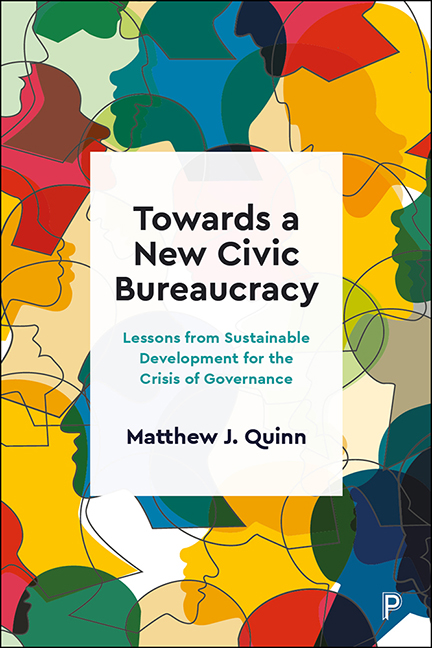Book contents
- Frontmatter
- Dedication
- Contents
- List of figures and tables
- Introduction
- 1 Framing the thinking
- 2 Governance and sustainable development as governmentality
- 3 Bureaucratic practice and governmentality
- 4 Lessons from governing for sustainable development
- 5 A new civic bureaucracy
- Closing words
- Appendices
- References
- Index
3 - Bureaucratic practice and governmentality
Published online by Cambridge University Press: 15 September 2022
- Frontmatter
- Dedication
- Contents
- List of figures and tables
- Introduction
- 1 Framing the thinking
- 2 Governance and sustainable development as governmentality
- 3 Bureaucratic practice and governmentality
- 4 Lessons from governing for sustainable development
- 5 A new civic bureaucracy
- Closing words
- Appendices
- References
- Index
Summary
The Corporation is civil society's attempt to become state; but the bureaucracy is the state which has really made itself into civil society.
Karl MarxMemories
As a final year student looking for a job, I was first attracted to the UK civil service by the intellectual environment and variety of roles it offered. With a certain innocence, I also had the sense of the service as operating systems which arbitrated impartially between differing societal interests in pursuit of the wider public interest. This was how I picked my initial department and first post – the Department of the Environment, working in the Planning: Land Use Policy division.
Day one as a fast-stream new entrant was an introduction to hierarchy and differentiation. I was first assigned a desk, to receive the comment from my new co-workers, only half in jest, that it had two too many drawers for my grade. There was also some humour about entitlements to a size of carpet or of room. I then was sent to collect my office supplies and was asked at the supplies room whether I was worthy of a green administrative tray, set aside for those of us who worked on policy, or a grey executive tray set aside for those who dealt with process. This distinction for civil servants dated back to Gladstone's time as Chancellor of the Exchequer under Queen Victoria, as the ‘footing best calculated for the efficient discharge of their important functions according to the actual circumstances of the present time’ and was still very much alive and well. The history of the civil service cast a long shadow. When I came to attend the then UK Civil Service College, the main buildings on the site were named after Northcote and Trevelyan – the 19th-century authors of the Gladstonian Reforms.
My boss's boss and his seniors had wooden, rather than metal, furniture, including a bookcase and small allocated drinks cabinet. My Assistant Secretary memorably took me for a long lunch at the local Italian restaurant, presumably to show me the potential rewards of the life to come.
- Type
- Chapter
- Information
- Towards a New Civic BureaucracyLessons from Sustainable Development for the Crisis of Governance, pp. 39 - 66Publisher: Bristol University PressPrint publication year: 2022



